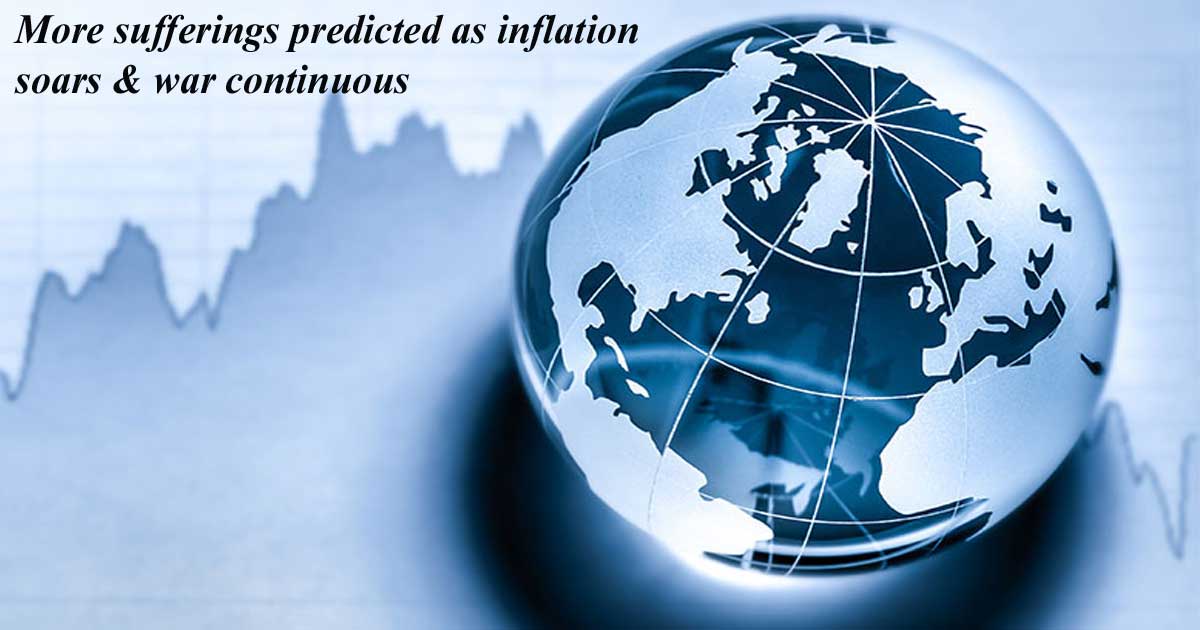This was supposed to be the year when the world economy recovered from the Covid pandemic. Instead, 2022 will be remembered for a new conflict, record inflation, and climate-related tragedies. It was a "polycrisis" year, as historian Adam Tooze coined the phrase.
Get ready for more gloom in 2023
"The frequency of crises has increased since the turn of the century," according to Roel Beetsma, a macroeconomics professor at the University of Amsterdam. "We have never seen such a difficult situation since World War Two," Consumer prices began to climb in 2021 as countries emerged from lockdowns and other restrictions following the Covid-induced economic crisis of 2020. Central bankers argued that excessive inflation was merely temporary and that economies will revert to normalcy. However, Russia`s invasion of Ukraine in late February caused oil and food costs to skyrocket.
Many countries are currently experiencing cost-of-living problems as wages fail to keep pace with inflation, forcing households to make difficult spending decisions. Central banks have had to play catch-up. They began raising interest rates this year in an effort to rein in spiraling inflation, risking plunging countries into catastrophic recessions because higher borrowing costs imply slower economic activity. In the United States and the Eurozone, inflation has finally begun to slow.
Careful spending
Consumer prices in the Group of 20 developed and emerging nations are expected to reach eight percent in the fourth quarter before falling to 5.5 percent next year, according to the Organization for Economic Co-operation and Development. The OECD encourages governments to provide aid to bring relief to households. In the 27-nation European Union, 674 billion euros ($704 billion) have been earmarked so far to shield consumers from high energy prices, according to the Bruegel think tank.
Germany, Europe`s biggest economy and the most dependent on Russia energy supplies, accounts for 264 billion euros of that total. One in two Germans say they now only spend on essential items, according to a survey by EY consultancy. Rising interest rates have also hurt consumers and businesses.
Both the US Federal Reserve and European Central Bank began to slow the pace of their rate hikes in December, but signaled they still need to go higher to get a grip on inflation. Economists expect Germany and another major Eurozone economy, Italy, to fall into recession. Britain`s economy is already shrinking. Rating agency S&P Global foresees stagnation for the Eurozone in 2023. But the International Monetary Fund still expects the world economy to expand in 2023, with growth of 2.7 percent. The OECD is forecasting 2.2-percent growth. The easing of Covid curbs in China is raising hopes for the revival of the world`s second-biggest economy and major driver of global growth.
The curbs had torpedoed China`s economy and sparked nationwide protests. China signaled this week that it was reopening to the world as it announced that it would end quarantines for overseas arrivals from January 8.
Climate costs
However, climate change, which is "happening in slow motion," is the most serious concern, according to Beetsma. According to Swiss Re, natural and man-made disasters have resulted in $268 billion in economic damages so far in 2022. Hurricane Ian alone cost an estimated $50-65 billion in insured losses. This year`s floods in Pakistan caused $30 billion in damage and economic loss. At the United Nations climate conferences (COP27) in Egypt in November, governments decided to establish a fund to compensate vulnerable developing countries harmed by natural disasters.
Despite the need to reduce greenhouse gas emissions and decrease global warming, the COP27 meeting finished with no new agreements to phase out the use of fossil fuels. "It is not an acute catastrophe, but a very long-term, persistent crisis," Beetsma explained. "If we don`t do enough, this will have an unparalleled impact on us."
JH






